CBS’ Rita Braver on Her Journalism Career and the Pandemic
Story Partners interviewed Rita Braver, a national correspondent for CBS Sunday Morning, to learn more about her career in journalism and her perspective on women in journalism and reporting during the pandemic.
Is there one story you covered in your career that you are most proud of, or is there one experience in your career that really stands out for you as a career-enhancing experience?
I feel very fortunate because I have covered scores of compelling stories and interviewed a long list of fascinating people. I’ve been able to report on politics, domestic and foreign policy, economic issues, national scandals, national celebrations, constitutional dilemmas, outstanding visual and performing artists, trends, recreation, cuisine and just about anything else. I have traveled to more than two dozen countries for CBS News and had a chance to question major newsmakers around the world.
After years of covering politics, law and other “hard news” subjects, the best career move I ever made was to join CBS News Sunday Morning, which I believe is one of the best shows on television. It is really a privilege to work for a broadcast that does such thoughtful stories on…as we like to say…everything under the sun.
How have women reporters changed journalism?
I think that when women are seen on air or in print, it means that we get to be part of the conversation. When women are reporting significant stories, it sends a message that we need to be included in every sector of society. It also means that “women’s” stories, are everyone’s stories. Most of us would never consciously write a news story from a “woman’s” point of view, but there are subtle influences and insights that do have an impact.
During my career, I have had the joy of watching women break through to the top on almost every beat in TV, print…and now digital. In fact, to my knowledge, I was the first woman to hold the job of Senior Law Correspondent for a major TV network. And I have seen women who work behind the scenes achieve top jobs as producers, editors and executives at all kinds of media organizations. It’s a pleasure to say that there are not many barriers left to be broken when it comes to women getting jobs in journalism.
Because media is such a visible occupation, it sends a message that every other workplace needs to be gender-diverse. And I am happy to say that we are finally realizing that for every institution, inclusion of people from different genders, races, and backgrounds is to the benefit of our society as a whole.
What is it like to be reporting during the pandemic?
Life is a challenge on all fronts during the pandemic, and reporting is no different. I have learned the elements of a good zoom set up, and how to do my own lighting. In-person interviews are harder to do, as you have to worry about being socially distanced and making sure that everything is safe and sanitized, while also worrying about the substance of the story. I am not ready to fly or stay in hotels, so for me the pandemic has meant that I often spend six or more hours traveling by car to do one interview. And I now carry a cooler with water and snacks, so that I don’t have to forage for food in unfamiliar places. When I do a story, I realize that the safety of the people that I am interviewing, as well as that of my own team is part of my responsibility as correspondent.
From an editorial perspective, we at Sunday Morning, are trying to show the huge impact that COVID-19 is having on people’s physical and mental health, as well as their economic security. But we are also trying to remind our viewers that we can still experience beauty, joy, fun and intellectual engagement.



